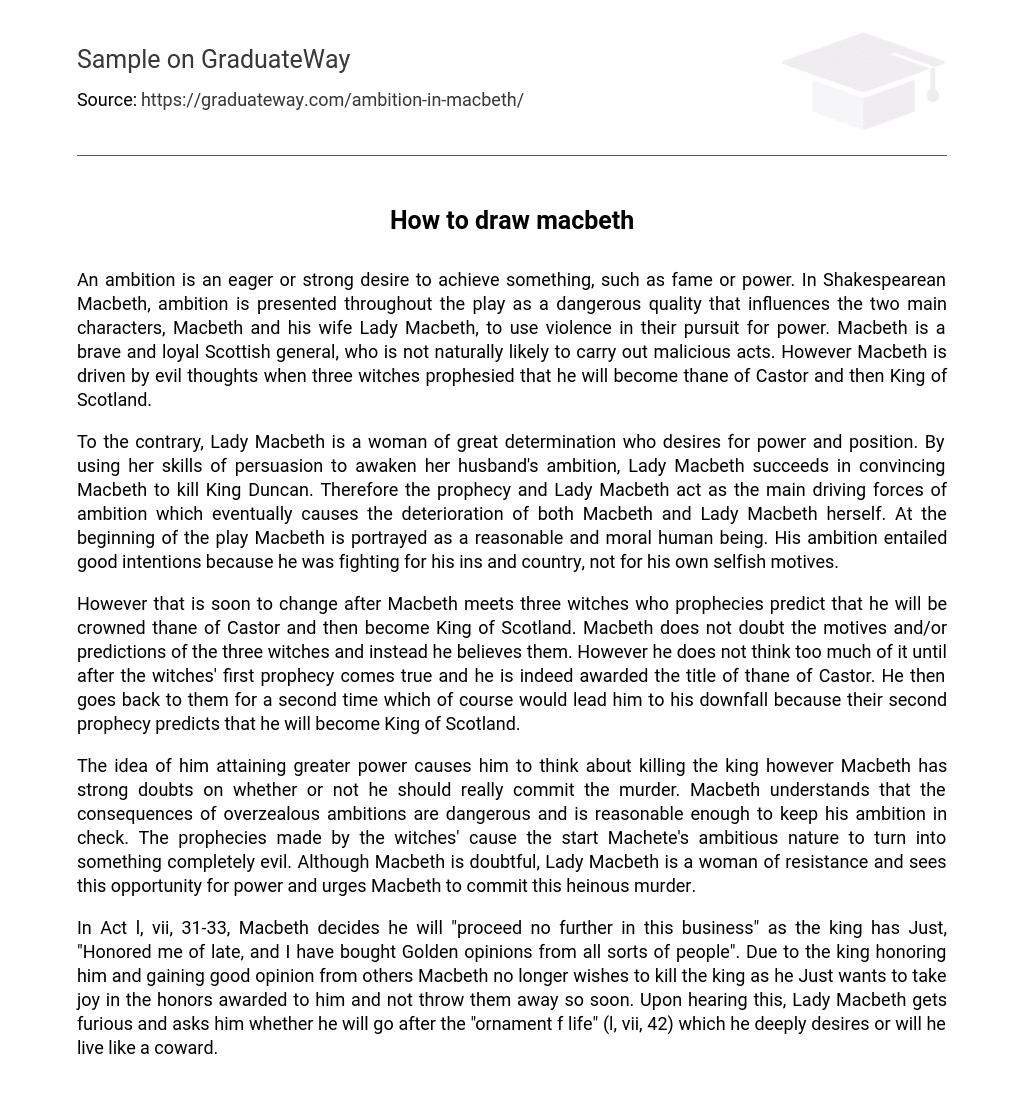An ambition is an eager or strong desire to achieve something, such as fame or power. In Shakespearean Macbeth, ambition is presented throughout the play as a dangerous quality that influences the two main characters, Macbeth and his wife Lady Macbeth, to use violence in their pursuit for power. Macbeth is a brave and loyal Scottish general, who is not naturally likely to carry out malicious acts. However Macbeth is driven by evil thoughts when three witches prophesied that he will become thane of Castor and then King of Scotland.
To the contrary, Lady Macbeth is a woman of great determination who desires for power and position. By using her skills of persuasion to awaken her husband’s ambition, Lady Macbeth succeeds in convincing Macbeth to kill King Duncan. Therefore the prophecy and Lady Macbeth act as the main driving forces of ambition which eventually causes the deterioration of both Macbeth and Lady Macbeth herself. At the beginning of the play Macbeth is portrayed as a reasonable and moral human being. His ambition entailed good intentions because he was fighting for his ins and country, not for his own selfish motives.
However that is soon to change after Macbeth meets three witches who prophecies predict that he will be crowned thane of Castor and then become King of Scotland. Macbeth does not doubt the motives and/or predictions of the three witches and instead he believes them. However he does not think too much of it until after the witches’ first prophecy comes true and he is indeed awarded the title of thane of Castor. He then goes back to them for a second time which of course would lead him to his downfall because their second prophecy predicts that he will become King of Scotland.
The idea of him attaining greater power causes him to think about killing the king however Macbeth has strong doubts on whether or not he should really commit the murder. Macbeth understands that the consequences of overzealous ambitions are dangerous and is reasonable enough to keep his ambition in check. The prophecies made by the witches’ cause the start Machete’s ambitious nature to turn into something completely evil. Although Macbeth is doubtful, Lady Macbeth is a woman of resistance and sees this opportunity for power and urges Macbeth to commit this heinous murder.
In Act l, vii, 31-33, Macbeth decides he will “proceed no further in this business” as the king has Just, “Honored me of late, and I have bought Golden opinions from all sorts of people”. Due to the king honoring him and gaining good opinion from others Macbeth no longer wishes to kill the king as he Just wants to take joy in the honors awarded to him and not throw them away so soon. Upon hearing this, Lady Macbeth gets furious and asks him whether he will go after the “ornament f life” (l, vii, 42) which he deeply desires or will he live like a coward.
Macbeth understands that killing King Duncan in the quest for power is morally wrong and expresses his wish to “dare do all that may become a man”(l, vii,47) and the man who “dares do more is none”(l, vii,48). This signifies Machete’s last sincere attempt at moral contemplation. However Lady Macbeth enraged at her husband’s decision to not go forward with the plan uses her skills of persuasion and manipulation to question his manhood which ultimately leads him to finally commit the crime.
After he murder of King Duncan, Lady Macbeth urges her husband to stay strong as he is overfilled with guilt and paranoia. It is evident, that Lady Macbeth is the second factor that drives Macbeth to overcome his sense of doubt and take action on the prophecies. Ambition has serious consequences in this play. Both Macbeth and Lady Macbeth experience physical and mental consequences as a result of their evil actions. Macbeth didn’t know when to stop, even after gaining the position as the new King of Scotland.
As the new ruler of Scotland, Macbeth allows his excessive ambitions to titivated him into going on a killing spree, killing anyone who might be a threat to his new-found power. As for Lady Macbeth, although she seemed to be the stronger of the two, Lady Macbeth at last becomes overwhelmed with guilt to an even greater degree than her husband. She is unable to cope with the consequences of their evil actions and eventually commits suicide. At the end of the play, Macadam finally kills Macbeth ending his reign of ambitious terror and Malcolm who is the son of late King Duncan is crowned the new King of Scotland.
The three witches’ prophecies and Lady Macbeth ruthlessness cause both Macbeth and Lady Macbeth go through an extreme extent in order to fulfill their ambitions. In hopes of wanting to be great and powerful, the couple sacrifices their morals to achieve their goal which ultimately strips them of their morality, honor and social conscience. Macbeth is a play about how ambition can turn destructive when it is unchecked by moral constraints. The play suggest that naked ambition can never be fulfilled and will eventually destroy anyone how falls into its deadly trap.





